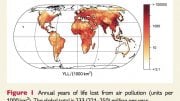
A comprehensive study in 322 Chinese cities reveals that acute exposure to air pollution significantly increases the risk of arrhythmia, particularly atrial flutter and supraventricular tachycardia. The research indicates that the association is immediate and persistent, underscoring the need for effective protection strategies for at-risk individuals during heavy pollution.
Can air pollution influence your heart? Recent research involving a comprehensive study of 322 cities in China, published in the Canadian Medical Association Journal (CMAJ), indicates that acute exposure to air pollution could potentially increase the risk of arrhythmia, or irregular heartbeat.
Globally, an estimated 59.7 million people suffer from common types of arrhythmia such as atrial fibrillation and atrial flutter, which could evolve into more severe heart diseases. While it’s known that air pollution is a controllable risk factor for heart disease, its connection to arrhythmia has hitherto yielded inconsistent evidence.
To determine whether there is a link, Chinese researchers evaluated hourly exposure to air pollution and the sudden onset of symptoms of arrhythmia using data from 2025 hospitals in 322 Chinese cities. Air pollution in China is well above the World Health Organization’s guidelines for air quality, and the researchers conducted their analyses using air pollutant concentrations from monitoring stations closest to the reporting hospitals.
“We found that acute exposure to ambient air pollution was associated with increased risk of symptomatic arrhythmia,” says Dr. Renjie Chen, School of Public Health, Fudan University, Shanghai, China, with coauthors. “The risks occurred during the first several hours after exposure and could persist for 24 hours. The exposure–response relationships between 6 pollutants and 4 subtypes of arrhythmias were approximately linear without discernable thresholds of concentrations.”
The study included 190 115 patients with acute onset of symptomatic arrhythmia, including atrial fibrillation, atrial flutter, premature beats (originating in either the atria or ventricles of the heart), and supraventricular tachycardia.
Exposure to ambient air pollution was most strongly associated with atrial flutter and supraventricular tachycardia, followed by atrial fibrillation and premature beats. Additionally, among 6 pollutants, nitrogen dioxide (NO2) had the strongest association with all 4 types of arrhythmias, and the greater the exposure, the stronger the association.
“Although the exact mechanisms are not yet fully understood, the association between air pollution and acute onset of arrhythmia that we observed is biologically plausible,” write the authors. “Some evidence has indicated that air pollution alters cardiac electrophysiological activities by inducing oxidative stress and systemic inflammation, affecting multiple membrane channels, as well as impairing autonomic nervous function.”
The authors note that the association was immediate and underscores the need to protect at-risk people during heavy air pollution.
“Our study adds to evidence of adverse cardiovascular effects of air pollution, highlighting the importance of further reducing exposure to air pollution and of prompt protection of susceptible populations worldwide,” they conclude.
Reference: “Hourly air pollution exposure and the onset of symptomatic arrhythmia: an individual-level case–crossover study in 322 Chinese cities” by Xiaowei Xue, Jialu Hu, Dingcheng Xiang, Huichu Li, Yixuan Jiang, Weiyi Fang, Hongbing Yan, Jiyan Chen, Weimin Wang, Xi Su, Bo Yu, Yan Wang, Yawei Xu, Lefeng Wang, Chunjie Li, Yundai Chen, Dong Zhao, Haidong Kan, Junbo Ge, Yong Huo and Renjie Chen, 1 May 2023, Canadian Medical Association Journal.
DOI: 10.1503/cmaj.220929









Be the first to comment on "New Research Finds That Short-Term Exposure to Air Pollution Could Increase Your Risk of Arrhythmia"